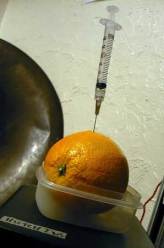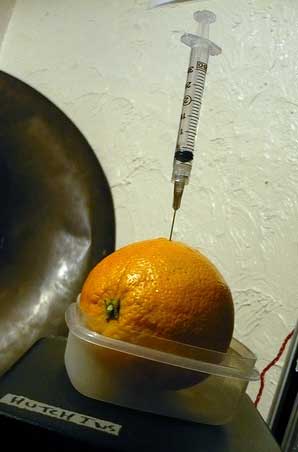
Like this, but the orange is the Earth, and the needle contains toxic fluids. (Photo by celesteh.)
There’s an episode of The Simpsons (“Trash of the Titans”) in which Homer is elected sanitation commissioner. He blows his budget on fancy uniforms and big trucks, making up the shortfall by allowing other cities to dump their garbage in an abandoned mine under Springfield. Eventually, the garbage starts pouring out of manhole covers and faucets, forcing the entire city to move.
Cartoons, right? No one in real life could ever be so foolish as to pack the ground full of waste and cross their fingers! Actually, according to a new report from ProPublica, they could.
Over the past several decades, U.S. industries have injected more than 30 trillion gallons of toxic liquid deep into the earth, using broad expanses of the nation’s geology as an invisible dumping ground. …
Records from disparate corners of the United States show that wells drilled to bury this waste deep beneath the ground have repeatedly leaked, sending dangerous chemicals and waste gurgling to the surface or, on occasion, seeping into shallow aquifers that store a significant portion of the nation’s drinking water. …
There are more than 680,000 underground waste and injection wells nationwide, more than 150,000 of which shoot industrial fluids thousands of feet below the surface. Scientists and federal regulators acknowledge they do not know how many of the sites are leaking.
As ProPublica documents with a slew of research and anecdotes, problems arise when dumpers, trying to take shortcuts, inject fluid into the ground at a higher pressure than is legal. The increased pressure can force wastewater through other fissures in the ground or damage the well caps, resulting in leaks. The Environmental Protection Agency estimates that operators have exceeded pressure limits more than 1,100 times in the past four years.
The report is staggering, illuminating a problem the scale and impact of which are both unknown. It’s very much worth a read. If you’d rather just cut to the most alarming quote, though, here it is:
“Are we heading down a path we might regret in the future?” said Anthony Ingraffea, a Cornell University engineering professor who has been an outspoken critic of claims that wells don’t leak. “Yes.”
Not much equivocation there. If worse comes to worst, we could pull a Homer and just move America. There’s gotta be land that Canada isn’t using.
Update: And don’t get us started on the earthquakes.




